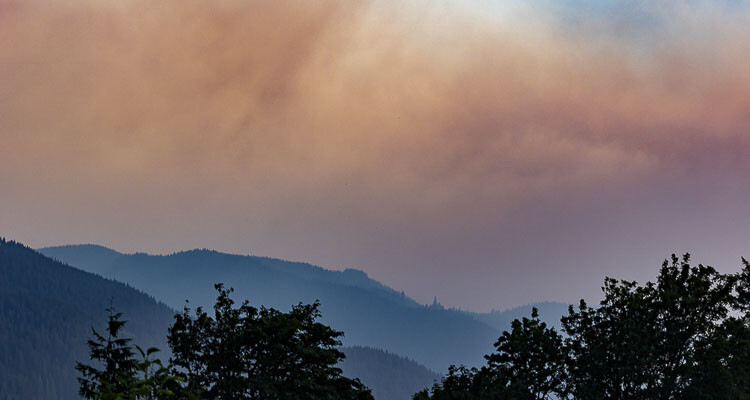
‘Smoke Ready Week,’ June 12-16, is the perfect time to prepare for unhealthy air
The threat of wildfires looms every year. The Washington State Department of Health (DOH) is urging the public to prepare now for smoke that can make air unhealthy to breathe. Smoke Ready Week, observed June 12-16, is an opportunity to take proactive steps to protect yourself and your family.
“We are expecting to have above normal fire activity in Washington by July,” said Kaitlyn Kelly, MPH, Air Quality Policy Specialist, DOH. “We have an outlook for below normal precipitation and that’s going to last into fall, so conditions are trending to a long fire season.”
When smoke arrives it’s important to reduce exposure by staying up to date on the forecast and air quality index, limiting time outside, and keeping indoor air as clean as possible. After several days smoke can enter homes and buildings through leaky gaps in windows and doors. Having a way to filter indoor air will benefit your health. It’s key to buy supplies in advance because they often sell out quickly when it’s smoky out.
Filter indoor air by using a:
- HVAC system with MERV 13 filter.
- HEPA portable air cleaner.
- DIY box fan filter.
“We no longer have smoke-free summers in Washington,” said Kelly. “It’s important to know what is in wildfire smoke and why it can be bad for your health.”
Smoke from wildfires contains fine particles and gasses including carbon monoxide. Exposure to smoke can cause a number of health problems ranging from minor to severe. Those with pre-existing conditions, infants and children, pregnant individuals, adults 65 and older, and people with heart and lung disease can be most sensitive to wildfire smoke. Minor symptoms can include headaches, stinging eyes, runny nose, and trouble breathing.
You can stay updated on wildfires, air quality, the forecast, and health information on the WA Smoke Blog. For more information on how to protect yourself from wildfire smoke, visit the DOH’s Smoke from Fires webpage.
The DOH website is a source for a healthy dose of information. Find it on Facebook and follow it on Twitter. Sign up for the DOH blog, Public Health Connection.
Also read:
- House Democrats advance $18B in tax hike proposals as session winds downHouse Democrats in Washington advanced several tax hike proposals as the legislative session nears its end, aiming to address a major budget shortfall.
- Republican budget leaders see showdown ahead as Senate Democrats approve trio of major tax increasesSenate Democrats in Washington have approved major tax increases, prompting Republican budget leaders to warn of a growing showdown ahead.
- Representatives from the 18th and 20th Legislative Districts to hold joint town hall on May 3Lawmakers from the 18th and 20th Legislative Districts will host a joint town hall on May 3 at Battle Ground City Hall to review the legislative session and hear from residents.
- Expect delays on northbound I-5 near Ridgefield through May 9Northbound I-5 travelers near Ridgefield should expect delays through May 9 as crews work on improvements at the Exit 14 off-ramp to support future development.
- Brandon Erickson announces candidacy for Clark County Charter Review CommissionBrandon Erickson has announced his candidacy for the Clark County Charter Review Commission, seeking Position 1 in District 2.
- Clark County Sheriff’s Office investigating a reported burglary that led to apparent suicideThe Clark County Sheriff’s Office is investigating a reported burglary in Vancouver that ended with the apparent suicide of Charles Gardiner, interim chief of the Cowlitz Tribal Public Safety Department.
- POLL: Why did voters reject all three tax proposals in the April 22 special election?Clark County voters rejected all three tax measures on the April 22 special election ballot, prompting questions about trust, affordability, and communication.











